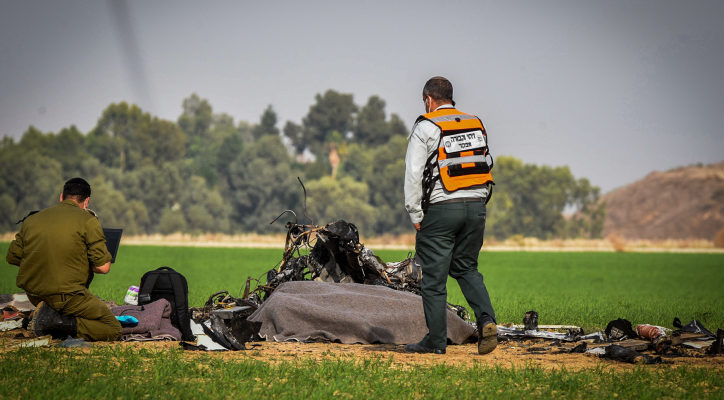Training crash that killed two IDF pilots was caused by a low-altitude wing stall, investigation concludes.
By Paul Shindman, World Israel News
The Israel Air Force on Wednesday released its findings following an investigation into a fatal training crash that killed two pilots, determining that a low altitude maneuver caused the aircraft to suddenly lose lift.
On November 24, flight instructor Maj. (res.) Itay Zayden, 42, and his student, Cpl. Lihu Ben-Bassa, 19, died instantly when their Snunit propeller plane crashed and burned near Kibbutz Mishmar Hanegev in southern Israel.
“The team of expert investigators turned every stone and carried out an in-depth and complex investigation,” said Air Force Commander Maj. Gen. Amikam Norkin.
The team of experts concluded that the airplane was in good mechanical condition, the IDF Spokesperson’s Office said in a statement.
“The accident was most likely caused by an uncontrollable flight condition due to stalling, while turning at a low altitude from which the crew could not, or did not, have time to escape before hitting the ground,” the report said.
An aircraft wing will “stall” when the normal flow of air that produces lift is disturbed, usually at low speeds. The loss of lift can cause the plane to roll uncontrollably and rapidly lose altitude.
The Snunit is the IAF name for the German-made Grob G120 single propeller training plane that has been in use in Israel since 2002 without incident. Technical specifications from Grob list the stall speed of the G120 as 104 kilometers per hour (61 mph).
The investigation team determined that a lack of familiarity with the risk of losing control of the flight at low altitude due to stalling had not been encountered during the 18 years that the 16 Snunit trainers have been in service. As a result, air crews were not trained to be aware of that situation.
The investigation also noted a lack of information in the aircraft manufacturer’s documentation regarding the stalling phenomenon that the crew experienced on this flight and that this risk has not been encountered by other operators of the same aircraft anywhere in the world. The same G120 is used for training by the air forces of Canada, France, Germany, Argentina and Kenya.
The low-altitude flight maneuvers have been performed by IDF student pilots for many years and were perceived as necessary for training purposes. The lack of familiarity with the phenomenon that was discovered led to a previous low-risk assessment in performing the exercise that caused the crash.
The quality of maintenance and compliance with the required maintenance operations was found to be high, and the Snunit was considered a reliable and safe aircraft that has trained dozens of air crews over the years.
The IAF will take several steps, including updating training procedures, to make sure pilots learn and understand the phenomenon that caused the crash, as well as informing the other operators of the G120 regarding the results of the investigation.
“For the purpose of this investigation, we performed a number of test flights in Israel and abroad, aboard a Snunit aircraft, the purpose of which is to prove the aerodynamic phenomenon that was discovered,” Norkin noted.
“Every accident is preventable and the lessons from this accident will be produced for the Air Force,” Norkin said. “I’m feeling the pain of the dear Zayden and Ben-Bassa families and we will continue to accompany them.”





